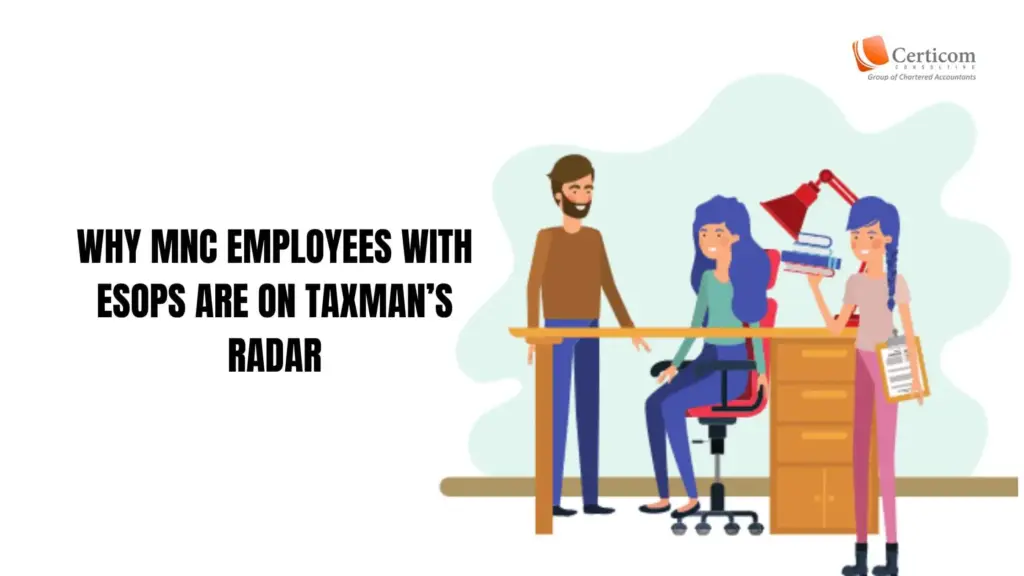Why MNC employees with Esops are on taxman’s radar

The Bangalore-based IT professional was shocked. He had received a summons from the tax department, demanding an explanation for his failure to report €22 deposited in his bank account in Germany. The engineer, who did not want to be identified, claimed he had never opened an account in that country. “After running from pillar to post, I realized that this had happened when I left my previous company here in 2017. The employee stock options offered to me by the parent company in Germany was automatically sold off when I quit the firm and the balance €22 owed to me was transferred to an account opened in my name and managed by a brokerage there,” he said.
On visiting the IT office, tax officials informed him that high value transactions of around €20,000 (about ?18 lakh) were done in this account the same year and this would be scrutinised under the Black Money (Undisclosed Foreign Income and Assets) and Imposition of Tax Act, 2015.This transaction, however, was the proceeds of the automated share sales. Yet, he was not aware that he had to declare the stock options as foreign assets.

How Esops are taxed
Esops received from overseas companies gets the same tax treatment as the Indian firms. Tax is to be paid on two occasions–one, when the Esop is exercised and second, when they are sold. RSUs also get taxed at the time of vesting and during sale. RSUs are cashless award stocks that are given at certain milestones, such as a promotion or after completing a predetermined number of years of employment with the company.
In Esops, the difference between the exercise price (the discounted price at which an employee gets the shares) and the fair market value (FMV) of the shares is treated as a perquisite and is taxed at slab rates. At the time of exercising the stock option, the employer in India deducts tax at source and it reflects in form 16 of the employee. The FMV is determined by a Sebi-appointed merchant bank and the employer carries out this exercise of getting the FMV.
Similarly, in the case of RSUs also, the Indian company deducts tax at source and deposits it with the government. As can be seen, the onus of paying taxes on the perquisite is with the Indian subsidiary of the company. The declaration of such stock options in the ITR, however, is the employee’s responsibility.
Some experts say stock options should be reported right from the time they are granted to an employee to avoid a tax notice. During the vesting period, Esops are considered the rights of an employee and seen as a form of foreign security in their name. “Till the time the Esops are in the vesting period and have not been exercised, it is prudent to show them under Part B of Schedule FA as ‘Financial Interest in any Entity’ with nil value. The exercised Esops are to be disclosed and reported under Part A3 of Schedule FA as Foreign Equity Interest held,” said Mayank Mohanka, founder, TaxAaram India, and partner, S M Mohanka& Associates.
Gautam Nayak, partner, CNK & Associates LLP, argues there is no requirement to disclose Esops that are vested but not exercised and taxpayers should not be held accountable for this. “In the vesting period, the employee doesn’t pay anything, so what should they disclose? There is no perquisite that is being granted yet either. The whole objective of the Black Money Act is to hold accountable payments made from undisclosed income,” he said.
In the case of RSUs, disclosures will be two-fold. “When RSUs are vested, an automated sale of 30% of the total shares is done by the foreign company and the sale proceeds are sent to the Indian subsidiary which uses this amount to pay tax on the remaining 70% shares and show it as TDS. The reason is that the taxpayer may not have cash available for TDS to be paid so some shares are sold to gather the required capital. Almost all the employees who get RSUs fall in the 30% tax bracket, hence 30% shares are sold. The employee has to identify the value of these 30% shares that are sold and report them as sale of shares under the capital gains head,” said Hegde.
Most employees are not aware of this and so do not report the capital gains. It should be noted that capital gains obligation will be almost negligible in such a case as the FMV and sale price in a same day sale are almost similar.
Consider this example: Ashwin is an MNC employee in the 30% tax slab and is given 1,000 shares worth ?50 lakh as RSUs. A total of 300 shares are sold at the time of vesting and the remaining 700 shares are transferred to his demat account overseas. The Indian employer uses ?15 lakh gained from the sale of the 300 shares to pay tax in India on the perquisite value of those 1,000 shares. Ashwin, though, has to declare 1,000 shares under foreign assets as all the shares were exercised in his name, report capital gains made on the 300 shares sold in his name and also report the net 700 shares as a perquisite on which tax is paid by the employer.
“Employees think that the net 70% shares is what has to be declared. Since the sale of the 30% shares also happens in their name, this too must be reported in the income tax return. Thus the entire transaction of all the shares is to be reported for the financial year in which such shares are transferred,” said Hegde.
Reporting ESOPs and RSUs in the ITR forms is not a tedious task as these values are available in form 16 issued by the employer. However, in the case of dividends lying in a foreign account, the taxpayer has to convert the value in the Indian currency at the telegraphic transfer (TT) buying rate on that day, said Mohanka.

Penalty of non-disclosure
Non-disclosure of ESOPs, RSUs and dividends may result in a penalty of ?10 lakh per year and even imprisonment of up to 7 years under the Black Money Act.
Hegde explained that the summons are first sent under the IT Act and, following an investigation by the assigned Income Tax officer, the matter may be treated under the Black Money Act only if the department has reason to believe that there was wilful non-disclosure or evasion.
Read More: A Comprehensive Guide: Precautions for Salaried Individuals Filing ITR
“Where the value of such stock options is over ?5 lakh, the probability of the case being converted under the Black Money Act is high. The IT department gives the taxpayer a chance to explain why the asset wasn’t disclosed,” said Mohanka.
Related Post
Top 7 Income Tax Errors That Invite IT Notices
Resident’s Guide to Buying NRI Property in India
Book A One To One Consultation Now For FREE
How can we help? *



